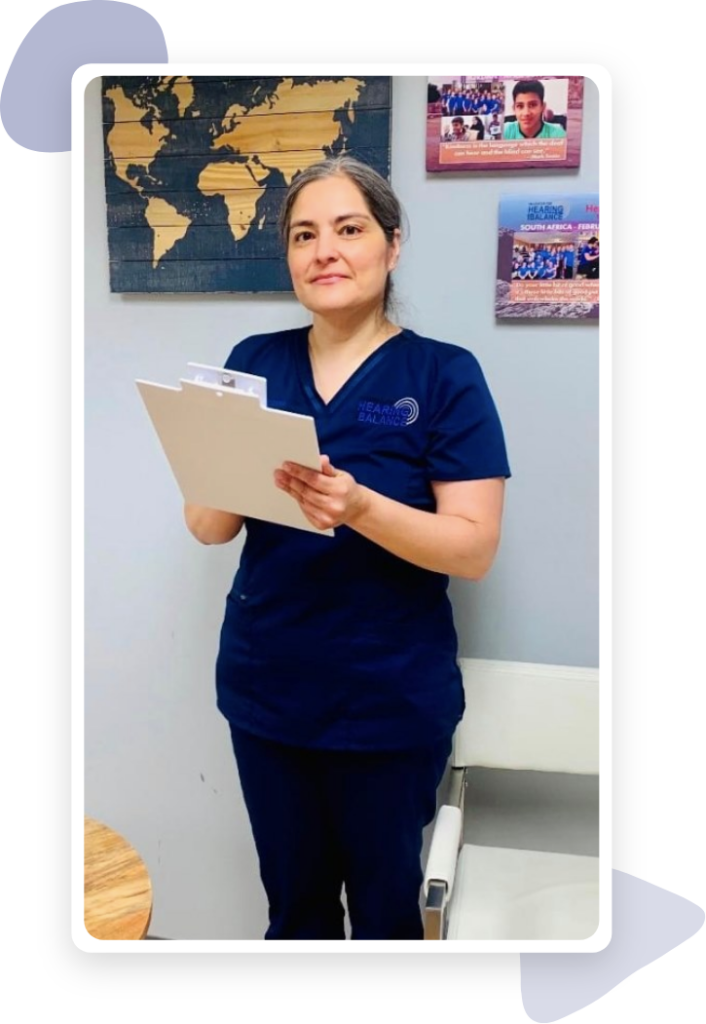HEARING LOSS
Hearing loss is the gradual or sudden loss of hearing in one or both ears, ranging from mild to severe. It can affect anyone regardless of age but this condition becomes more common among people aged 60 and above.
Aside from conducting routine hearing tests, our audiologists may also conduct an interview to assess your lifestyle, communication needs, cosmetic preference and budget.
This process is highly important for hearing aid selection. Be as open and honest as you can to your audiologist. Whether you need a discrete model or need a heavy duty hearing aid for public speaking, all these things need to be factored-in for an audiologist to present better hearing aid options.

THE DANGERS OF UNTREATED HEARING LOSS
Numerous studies have established that people with untreated hearing loss are prone to higher rates of social isolation, depression and cognitive decline.At PA Center for Hearing and Balance, we advocate early detection and treatment of hearing loss. From a medical point of view, hearing loss exposes people to higher medical expenses and other health risks and issues such as being prone to accidents and falls.
HEARING AIDS - A LIGHT AT THE END OF A TUNNEL
Being diagnosed with hearing loss does not mean a dead end, nor does it mean that you will have to think that this is a disability you’ll have to live with for the rest of your life. With the advancements and innovation of technology today, it’s safe to say that hearing loss can be dealt with in many different ways.
Hearing aids are the top of mind hearing loss busters. But, with all the brands and models available in the market, choosing one would be quite overwhelming, right?
Our audiologists at PA Center for Hearing and Balance aims to help you and simplify the process of choosing hearing aids. The first thing that we can do is to give you a thorough hearing assessment so we can set the baseline on what needs to be done to achieve an effective hearing solution.
PA Center for Hearing and Balance eliminates all the doubts and blind treatment – we make sure to correlate the results of your hearing aids along with your personal preferences and narrow down your choices for the most effective hearing aids.
Let us be your partner in winning over hearing loss. Come visit us or set an appointment at PA Center for Hearing and Balance. Cheers to healthy hearing!

FREQUENTLY ASKED QUESTIONS
The main cause of hearing loss is aging and exposure to loud noise. These two factors bring about significant wear and tear on the hairs, otherwise known as nerve cells of the cochlea, which is responsible for sending sound signals to the brain.
Old age, that cannot be prevented; however, being exposed to loud noises can.
When the nerve cells become damaged or missing, the process of transmitting electrical signals becomes disrupted, resulting in hearing loss.
You know the common cliche “You’ll never know what you’ve got until it’s gone”? Losing your hearing may be likened to that, hence, it is very essential to take care of your hearing health to prevent hearing loss.
From the name itself, noise-induced hearing loss is usually brought on by being exposed to excessively loud levels of sound.
What’s discouraging about noise-induced hearing loss is that it cannot be corrected medically or surgically. No pharmaceutical drug exists to treat hearing loss or make it go away.
Take extra precautions to avoid noise-induced hearing loss by trying to adopt behaviors that protect the integrity of your hearing such as:
Avoiding or limiting exposure to excessively loud sounds (try not to put the volume of your headset in full blast). Your favorite song playing is not an excuse to damage your ears.
If possible,move away from the source of loud sounds. Whether you work as a DJ or assigned to mow the lawn, make sure that you use hearing protection. Take these tips and information by heart because once you lose your hearing, you can never get it back like new.
Harmful levels of noise can affect any person at any age. Sounds are part of our everyday life – TV, traffic noise, music, household appliances, etc. More often than not, the sounds we encounter every day are normal and at moderately safe levels that won’t cause any damage to hearing.
However, there are also instances when people are exposed to loud sounds. People who work as music producers (concerts), musicians, factory workers, industrial workers, operators of heavy machineries, hunters – all of them may be susceptible to hearing loss for being exposed to loud noises. When exposed regularly to loud noises, the hairs of the cochlea may disintegrate over time which will eventually lead to hearing loss.
We can’t reiterate this enough – loud sounds can damage the nerves and membranes in the cochlea. Being exposed to loud noise over time can overwork or disintegrate the hair cells in the ear.
As the exposure continues, hearing loss also progresses. Some may not notice that they are slowly losing their hearing until it’s too late; until they notice that their family, friends and colleagues have been repeating themselves one too many.
Remember, the harmful effects of hearing loss may continue even after harmful noise exposure has ceased.
At PA Center for Hearing and Balance, we make sure to assist our patients regardless of the stage of their hearing loss. From hearing loss detection down to fitting of hearing aids and follow up checkups, we are committed to be with our patients every step of the way.
The symptoms of gradual hearing loss may not be noticeable in the early stages. This is why it is important to get regular hearing check-ups (at least yearly). Over time, the sounds may become muffled or distorted, and people with noise-induced hearing loss may find themselves asking their family or friends to repeat themselves more often.
The volume on the TV may be turned up more than the usual, and family members might tell a person with undiagnosed hearing loss to turn it down because the volume is already too loud for people with normal hearing. These tell-tale signs, along with ringing, roaring or buzzing in the ears or head (tinnitus) may be experienced alone or together.
The damage from noise-induced hearing loss, combined with aging can lead to severe hearing loss.
When a person is suffering from severe hearing loss, hearing aids may be needed to magnify sounds and help them communicate and participate in daily activities.
If you or someone you know is dealing with hearing loss – whether mild or severe – PA Center for Hearing and Balance has its doors open to assist you. Our audiologists can help you or your family member deal with hearing loss – from assessment down to hearing aid fittings and follow up checkups.
When sounds start to become muffled or distorted, you may ask yourself – why am I losing my hearing?
Hearing loss may be caused by different factors – aging, exposure to loud noises or genetics. When hearing loss happens, it may be devastating for the patient and his or her family. However, it’s not the end of the world – with the right treatment and partnership with an audiologist, hearing loss can be bearable.
Support from family and friends also plays a big role with hearing loss. Speaking of support, hearing aids are the topmost available devices that can help people with hearing loss.
Before treatment options are presented, an audiologist needs to conduct a thorough hearing test to establish the type, severity, and cause of hearing loss. At PA Center for Hearing and Balance, we conduct an interview with a patient to get medical background.
If you are planning to set an appointment at PA Center for Hearing and Balance, Springfield PA, we would suggest that you bring along a family member or a friend to help us get the most accurate results from the interview.
Hear Better. Live Better.
-
130 S. State Road,
Suite 201 Springfield, PA 19064 -
905 West Sproul Rd,
Suite 201 Springfield, PA 19064 - 610-438-5203
